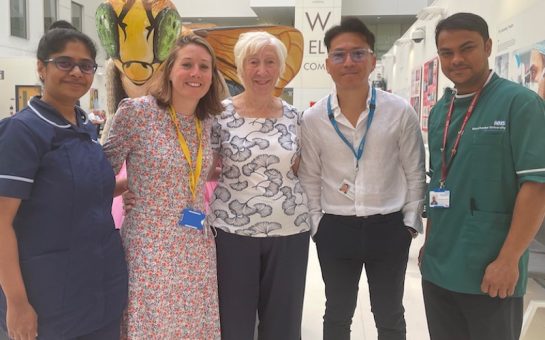Exclusive by Danielle Wainwright
New mothers are being urged to donate their babies’ umbilical cords to help treat the thousands of needy patients in Manchester that require lifesaving blood transfusions.
A petition to increase awareness and availability of umbilical cord donation by the Department of Health has received more than 30,000 signatures and hope to make cord donation education compulsory for pregnant women.
Around 80% of transplant requests would be met if the UK saved just 50,000 cord blood units. In the UK alone last year, 65,000 litres of cord blood were thrown away according to the Department of Health.
Velibor Milovanovic, Head of Cord Development for blood charity Anthony Nolan, said: “We currently collect cord blood in five hospitals around the UK and the NHS collects in a further six.
“We have received an amazing response in these areas, including Birmingham Women’s Hospital where we have just announced the collection of 1,000 cord blood units our first year of opening.
“We know that the cord blood collected will help us save the lives of more blood cancer patients in the future.”
Mothers can save lives by donating the blood stored in the umbilical cord and placenta following the birth of their baby.
The blood is normally disposed of after birth but can be used in lifesaving stem cell transplants for patients with blood cancer, such as leukaemia. This provides a useful alternative for patients who cannot find a match on the adult bone marrow donor register.
Blood from the umbilical cord is normally disposed of after birth but can be used in lifesaving stem cell transplants for patients with blood cancers, such as leukaemia. This provides a vital alternative for patients who cannot find a match on the adult bone marrow donor register run by the charity.

Since the success of the petition, the government have responded and said: “The Government is committed to improving UK stem cell services and has allocated a total of £12million to help implement the recommendations of the UK Stem Cell Strategic Forum report.
“To date, this funding has resulted in an increase in the number of banked clinical grade cord blood units, as well as an aligned UK stem cell register and an increase in adult stem cell donors recruited to the register.
“The cord blood samples stored in the UK’s public cord blood banks are available to patients across the country, and there is no scientific or financial case for the routine collection of cord blood.
“The Government knows that black, Asian and minority ethnic populations are less likely to find a matched adult stem cell donor. To try to address this, cord blood collection centres have been sited at hospitals in areas of highest ethnic diversity.”
Anthony Nolan also received a £1.5 million boost to last week, making them the largest cord blood donation programme in the UK.
The grant will fast track the expansion of the charity’s pioneering cord blood collection programme from five hospitals to eight – a move which will make Anthony Nolan the biggest public cord blood collection programme in England.
Henny Braund, Chief Executive of Anthony Nolan, has welcomed the funding as ‘potentially life-changing for so many people.’
“I’m absolutely delighted at this news which has given the green light to developing our cord blood collection programme even faster than we had hoped,” he said.
“Anthony Nolan is incredibly proud to be expanding into the position of the biggest public cord blood collection programme in England. This award is a testament to the vital importance of our work in saving the lives of people with blood cancer and other blood disorders who so desperately need a stem cell transplant.
“Cord blood is such a precious resource but it’s simply thrown away. Thanks to the RGF funding, we can help more mums save the life of someone with blood cancer.”
The e-petition remains open to signatures and will be considered for debate by the Backbench Business Committee should it pass the 100,000 signature threshold.
Please click here to sign the petition.
Images courtesy of Jan vd Brink and Jitsen Chang via Flickr, with thanks.
For more on this story and many others, follow Mancunian Matters on Twitter and Facebook.



